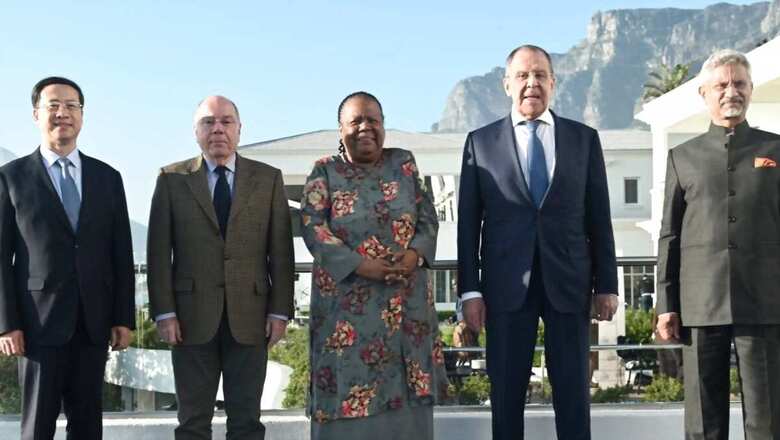
views
The BRICS group of emerging markets is ramping up its efforts for greater global influence and calling for use of a common currency in international trade in a bid to challenge the global hegemony of the US dollar.
Foreign ministers from BRICS nations- Brazil, Russia, India, China and South Africa- met over two days in Cape Town and were joined by counterparts from countries including Saudi Arabia, the United Arab Emirates, Egypt and Kazakhstan.
In a joint statement issued at the end of the meeting, the BRICS nations underlined the need for using local currencies in international trade and financial transactions.
A potential new shared currency between them could shield other member countries from the impact of sanctions such as the ones imposed against Russia by the US and European countries.
Proposals for Shared Currency
The BRICS meeting comes at a time of heightened tensions between the US and China; and member countries like Russia and China are moving ahead to become a counterweight to the US and the European Union. Brazilian President Luiz Inacio Lula da Silva is also a vocal supporter of a shared currency.
The BRICS nations are looking to “ensure that we do not become victims to sanctions that have secondary effects on countries that have no involvement in issues that have led to those unilateral sanctions,” Naledi Pandor, South Africa’s minister of international relations, reportedly said after the meeting, according to WION.
As part of the effort to come up with a shared currency, proposals are being considered at the New Development Bank, the Shanghai-based lender created by BRICS members.
Anti-Dollar Sentiment
There is a global backlash against the hegemony of US dollar in the global market. Russia has been vocal in using trade in local currency for the overall process of “de-dollarisation”.
Recently, Brazil and China struck a deal to trade in their local currencies bypassing the US dollar. India and Malaysia have also signed a deal to ramp up the use of rupee in bilateral trade.
China is actively trying to present Yuan as an alternative to the dollar. China’s yuan has surpassed the US dollar as the most traded currency in Russia as Moscow continues to deepen its political and economic ties with Beijing. Western countries like France is also starting to complete transactions in yuan.
In March, the Indian government said as many as 18 countries – including Russia, Sri Lanka, UK – have expressed interest in settling overseas trade with India in Indian rupee.
BRICS Expansion on Cards
Senior officials from more than a dozen countries, including Saudi Arabia and Iran, were in talks on forging closer links with the BRICS bloc during the Friday meet.
BRICS is considering expanding its membership, and a growing number of countries have expressed interest in joining. China said last year it wanted the bloc to start a process to admit new members.
External Affairs Minister S Jaishankar said BRICS expansion is still a work in progress and member nations are approaching the idea with a positive intent and an open mind. Brazilian Foreign Minister Mauro Vieira said he concurred with Jaishankar’s view.
Iran, Saudi Arabia, the United Arab Emirates, Cuba, Democratic Republic of Congo, Comoros, Gabon, and Kazakhstan all sent representatives to Cape Town for so-called “Friends of BRICS” talks. Egypt, Argentina, Bangladesh, Guinea-Bissau and Indonesia were participating virtually.




















Comments
0 comment